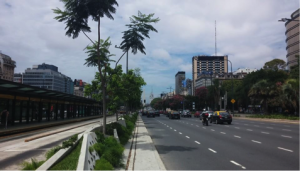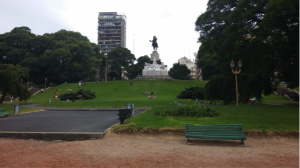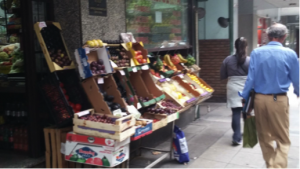 |
| Avenida 9 de Julio, the widest avenue in the world! |
I haven’t been immune to culture shock, but to me that term is a little misleading, as it leads me to envision one giant, instantaneous jolt upon arrival. My adaptations so far feel more like responses to smaller happenings. Culture nuggets, I like to call them. Though small on their own, when combined they still create the feeling of navigating a challenging new landscape.
 |
| Monument in the park on Avenida Libertador |
It’s the small things that throw me off, like the slightly different layout of the keyboards on Argentine computers. The first time I logged on a desktop here, it took me about 5 minutes to figure out how to type the ´@´ key (which is called ‘arroba’ in spanish). Or how most stores don´t display prices on anything for sale. Though a small inconvenience, it disrupts my American inherent, unconscious values such as efficiency, straightforwardness, and an accustomation to consumer entitlement. Wandering the store without being able to compare prices makes it hard for me to organize my shopping trip and manage my budget. This may be more representative of a more relaxed consumer culture, but I have also discovered that there is an economic rationale behind this: the Argentine peso is not nearly as stable a currency as the dollar, and inflation can cause frequent fluctuation of prices. It would be very unwieldy to keep changing price tags throughout the store with every change in value. It’s also shrewd in terms of competition: by not labeling prices, it impedes the customer from making comparisons between stores and more likely just to buy from their present store. I’ve discovered this flexibility is a necessary adaptation in many areas.
The more laid back nature of Argentine culture is apparent in other areas as well. One of the most obvious is the overall pace of the day, especially towards dinner time. Argentines like to indulge in a relaxed, stretched out dinner known as the ‘sobremesa’ that begins around 9 or 10 pm. This longer dinner time emphasizes coming together and building relationships rather than optimizing dinner as a quick way to refuel before the next activity, as we are prone to do in America. This late dinner time has been one of the most difficult things to adjust to as a gringo, but the ubiquitous empanada kiosks make for a convenient snack. And after only about a week and a half, I am coming to appreciate the way the afternoon feels elongated. The relaxed pace can be a pleasant change from the go-go-go mentality I succumb to at college in the states.
But it would be erroneous to make a blanket statement that everything is simply more relaxed in Argentina. In some areas it can be even more straightforward than what I’m used to in America. For example, I sparked a conversation with an Argentine girl one night while I was out and we talked for a few hours. Throughout this time, on several occasions she sought to reaffirm that I did indeed like her and was not bored by her. After some reflection the next day I realized that Argentine men can be very direct in speaking to women, with lots of apparent come-ons and compliments to assert their interest. My casual style of taking the conversation more slowly to feel it out could have come off as aloof or bland.
There are also many small things that I love about living in Buenos Aires. Fresh fruit vendors populate every couple of street corners in the city, allowing easy access to succulent peaches, plums, grapes, bananas, and mangos. Every instance crossing the street turns into a miniature adventure - the traffic style is more fluid and chaotic than in the states, and pedestrians are not afraid to take the initiative to hop across whenever there is a small break in the cars, not waiting for the go-ahead light. Somehow it works out for everyone - I have not seen a single accident since arriving. The city is a carnivore’s paradise - I’ve had some of the best meat of my life here, especially on CEA trips to a local peña restaurant and Tigre delta, a short train ride from the city. The empanadas, choripan (sausage sandwiches similar to bratwurst), and carne asado (grilled beef) certainly satisfy my hunger.
 |
| One of the many fresh fruit stands in the city |
It still feels unreal to be here after so much planning and anticipation, like I’m living someone else’s life. Yet I couldn’t be more excited about the challenges and joys of my new home. I know that over time I will be able to master both the large and small changes with patience and perseverance!
 |
| Yo mismo on a river cruise in Tigre Delta |
Maximilian Mohr is the Spring 2014 CEA MOJO in Buenos Aires, Argentina. He is currently a junior at William and Mary.











